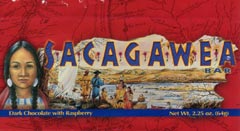

«Missouri River • Great Plains • Rocky Mountains» | «Radio • Writs • Ride • Resources»
our journey's heroine has her own candy bar...
06/27/2001: McLaughlin, SD |
"native" relationship(s)... I'm not sure that I can write to what L & C were feeling (me being the less erudite about that particular historical aspect of our trip), but, having grown up here on the Standing Rock Reservation and being part Sioux myself, I've been trying to consider this very thing. To be honest, I've always felt a bit estranged from the natives, both Indians and Non-. While my father is an enrolled member of the tribe, works at the local Indian Health Service facility and with us living in tribal housing, I was sufficiently light-skinned to be considered white by the Indians. But for these very same reasons, my fellow white classmates often considered me too "Indin" to wholly accept as well. Obviously, my observations are colored (Pardon the pun). That notwithstanding, I would sum up our relationship to the natives, thusly: We are strangers here, just as L & C where during their expedition. Most folks treat us a bit cautiously, but curiously. And from what I've read of the journals, it seems as if the natives did the very same. Open hostility has been rare for us (namely, rednecks in red trucks), just as it had been with the Corps of Discovery. I wouldn't go so far as to suggest that a couple of people biking along the Missouri River is as rare an event now as theirs was then, but it does seem unusual to folks along the way, who mostly want to know what in hell we're doing and why. I'll stop with the similarities before I degenerate to platitudes and cliches. So many circumstances have radically changed in the intervening two hundred years: economics, industry, technology, language, religious and cultural practices, travel mechanisms, politics. There probably isnít an element of human activity that has remained untouched in that time. There is one further similarity that I would like to point out, though. Population density: I don't have concrete figures but much of what I've read before and during the trip would seem to indicate a general decrease in population in the Plains States. So much so, that Frederic Turner Jackson's assertion that the Frontier be officially "closed" could seriously be questioned (caveats to historian Patricia N. Limerick, Richard Manning's "Grassland" and Dayton Duncanís "Out West"). The Plains are a sparsely inhabited place these days, much as they were then. |
«Missouri River • Great Plains • Rocky Mountains» | «Radio • Writs • Ride • Resources»
©2001 Barrett Golding / Josef Verbanac
![]() Funding from the Corporation for Public Broadcasting
Funding from the Corporation for Public Broadcasting